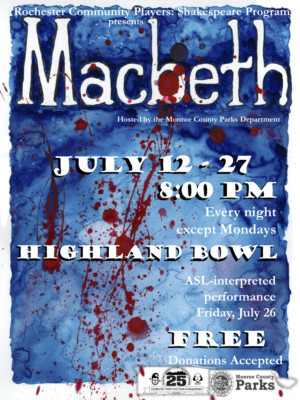Review: MACBETH at Rochester Community Players Shakespeare Program

One of the great themes in Shakespeare's works speaks of the interconnectedness of humanity and nature. It tells of a harmony that insures naturalness to life and living. Paramount to attaining this balance, men and women must respond to the world guilelessly through acts of honor, respect and dignity. To Shakespeare, only through these natural values can we realize "good husbandry" or the proper maintenance of our station in life. Evil springs from actions that tear individuals away from the peaceful harmony of nature. Corruptions like selfishness break the bonds that tie us to each other and the world.
- For over 400 years, people have been gathering together to hear this sentiment from our most renowned author. What better place to do it than outdoors, on a green in a park amidst the sounds of birds and bugs intermittently interrupted by the distant cacophony of traffic and planes? The setting itself reminds us metaphorically of the theme presented, and for 20 years The Rochester Community Players: Shakespeare Program has been treating their audiences to this tradition and pleasure at Highland Park.
In this summer's production of Macbeth, director Jean Gordon Ryon takes an historical approach, setting the play in medieval Scotland with costumes reminiscent of the movie Braveheart. The set design by Ken Dauer is a reconfiguration of a traditional Shakespearean set. It's minimalism captures a rough-hewn, primitive age. Even the natural surroundings of the Highland Bowl add to the austerity and sparseness of the entire production, linking the action of the play to the human struggle in a harsh, mysterious, supernatural world. The atmosphere is further enhanced by the use of ominous music and an expanded coven of witches beyond the usual three hags. These witches present Macbeth with tidings of good fortune, but instead of being satisfied with fulfilling his new position as Thane of Cawdor, his unchecked desire and personal ambition prompt him to overreach and act upon his bloody, unnatural urgings.
Though this production is not innovative, Shakespeare's story is clearly told. Even considering the fact that Macbeth is the shortest of the tragedies, this production's action moves quickly and effectively. The simplicity and clarity of acting allows Shakespeare's brilliant words to come to the fore, reminding the audience of the greatness of the work. Ged Owen as Macbeth and Lauren MacDonough as Lady Macbeth both show a facility with the language that fosters a lucidity of intent and purpose. However, their breeziness of language denies an exploration of the emotional underpinnings of this complex, dynamic relationship. In this case, characterization is sacrificed for thematic clarity. Rob Kellogg shines as Malcolm especially as his insecurity at becoming king grows to determination and ultimately to strength. James R. Heath turns in the most complete performance, playing Macduff with raw emotion and depth. The meeting of Macduff and Malcolm in Act V is a real treat to watch and stimulated spontaneous applause from the audience.
The weird sisters played by Tracy A. Ulterino, Kirsilyn C. Harris and Elizabeth Michalek as well as Amy Canfield's Hecate are effective in creating the necessary mystery and otherworldliness in the production. T. Bohrer's performances as both Priest and Doctor stand out for his naturalness.
All in all, this free community performance at Highland Bowl has flaws and lacks the depth one would expect to see in a professional production. However, it conveys clearly and effectively the greatness of the Bard's words and intent. On opening night as we sat outside in the park with darkness descending upon us, we experienced the connection between play and audience, between humanity and nature. And in our modern time, when political selfishness is the hallmark of the age, Macbeth reminds us to put duty before self and to live in harmony with others and our world.
Pack a picnic, take a blanket and some bug spray and commune with nature and your fellow lovers of the Bard at this free 25th anniversary performance by the Rochester Community Players: Shakespeare Program. You will experience Shakespeare as a rich shared experience.
Performances are every night except Mondays, July 12-27 at 8pm. ASL interpreted performance is Friday, July 26.
Your Article Text Here!
Reader Reviews

Videos
